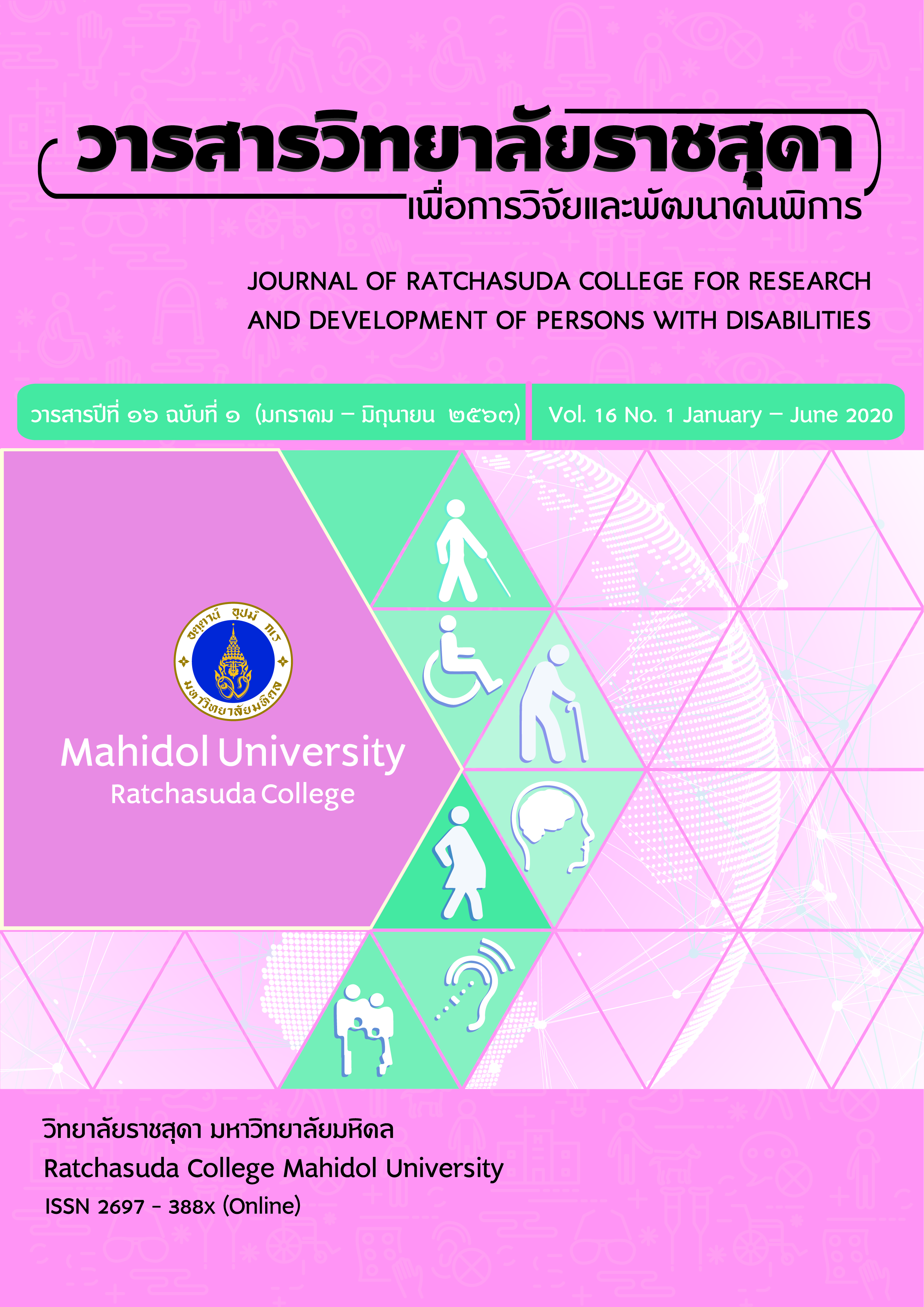Effect of Juggling Ball Training on Mental Rotation Performance in Students with Learning Disabilities, Banhauikhama School
Keywords:
Juggling Ball, Mental Rotation, Learning DisabilitiesAbstract
The objective of this research was to investigate the effect of juggling ball task on mental rotation among students with learning disabilities in Banhuaikhama School. The sample of this research was to 10 students with learning disabilities in Banhuaikhama School under the supervisor of Loei Primary Education Service Area Office 2. They are studying in grade 4-6 in the academic year 2019. They are 10-12 years old, divided into 6 male students and 4 female students. The sample was selected based on a purposive sampling. The research instruments were juggling ball task and mental rotation task. Data were then analyzed using statistics, including percentage, mean, and standard deviation, and Wilcoxon Signed Ranks Test.The results indicated that after trained with juggling ball task, a mean score on mental rotation of the sample was higher than before with a statistical significance (p< 0.05). In conclusion, juggling ball task can promote the mental rotation ability among students with learning disabilities.
Downloads
References
Ekakun, T. (2007). Research Methodology in Behavioral Sciences and Social Sciences (5th ed.). Ubon Ratchathani: Wittaya Offset Printing.
Hannaford, C. (2006). Smart moves why learning is not all in your head. (Noppadon Champa, translator). Bangkok: Kwan Khaow '94.
Jansen, P., Corinna, T., & Martin H. (2009). The Influence of Juggling on Mental Rotation Performance. International Journal of Sport Psychology, 40(2), 351-59
Krabaonrat, C. (2007). Stretching. Bangkok: Kasetsart University, Thailand.
Lazar, S. et al. (2009). Shrink Rap Radio# 225. The Neuroscience of Meditation, 1-12.
Ministry of Education. (2008). Guidelines for organizing student development activities in accordance with the basic education core curriculum B.E. 2008. Retrieved form https://drive.google.com/file/d/11w4svmFCVG0vE4bF7GartzWkUZN vC3Re/view
Ministry of Education. (2011). Basic knowledge and guidelines for developing students with learning disabilities. Retrieved form https://www.slideshare.net/napa donyingyongsakul/ss-10723224.
Ministry of Education. (2008). Education provision for persons with disabilities act B.E. 2008. Retrieved form www.moe.go.th/moe/nipa/ed_law/p.r.g.edu35.pdf
National Institute of Educational Testing Service (Public Organization). (2017). yearbook 2017. Retrieved form https://www.niets.or.th /uploads/content_pdf/p df_ 1533870929.pdf
Nuchlamyong, A. (2003). Conditions and problemes of disable teams preparation for 8th FESPIC game at Busan Korea. Srinakharinwirot University, Bangkok, Thailand.
Ponmuk, C. (2019). Special child. Matichon Online. Retrieved form https://www.matichon.co.th /article /news_1594610.
Rawiboon, J. (2003). Teacher and parent's manual for children with learning-writing problems. Bangkok: Kurusapa Business Organization.
Reed, S.K. (2004). Cognition theory and applications, Belmont: Wadsworth /Thomson Learning.
Thawara, W. (2008). Mental rotation in undergraduate students. Chulalongkorn University, Bangkok, Thailand.
Vitale, B. M. (2015). 65 Brain Development Strategies to Their Highest Potential. (Dusadee Boripatra Na Ayutthaya, translator). Bangkok: Nanmeebook.
Whitman, R.D., Holcomb, E., & Zanes, J. (2010). Hemispheric collaboration in creative subjects: Cross-Hemisphere priming in a lexical decision task. Creativity Research Journal, 22, 109-118.
Downloads
Published
How to Cite
Issue
Section
License
บทความที่ได้รับการตีพิมพ์เป็นลิขสิทธิ์ของวารสารสถาบันราชสุดาเพื่อการวิจัยและพัฒนาคนพิการ






